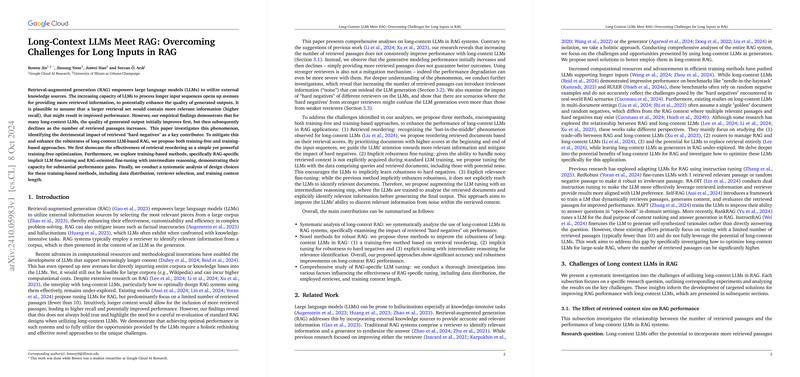Overview of "Long-Context LLMs Meet RAG: Overcoming Challenges for Long Inputs in RAG"
The paper "Long-Context LLMs Meet RAG: Overcoming Challenges for Long Inputs in RAG" presents a thorough analysis of how retrieval-augmented generation (RAG) systems can effectively leverage long-context LLMs. Authors Bowen Jin et al. tackle significant issues around the interplay of increased retrieval contexts and LLM performance, providing empirical evidence that adding more retrieved passages does not straightforwardly improve performance. Instead, the performance follows an "inverted-U pattern," highlighting the adverse impact of "hard negatives."
Key Findings
The paper introduces several insights crucial for the design and optimization of RAG systems:
- Impact of Retrieved Context Size: The research demonstrates that while increasing the retrieved passage count can initially boost performance, it eventually leads to a decline due to the introduction of irrelevant or "hard negative" passages that mislead the LLMs.
- Influence of Retriever Quality: Stronger retrievers may exacerbate the inclusion of hard negatives, revealing that precision alone is not a reliable metric for retrieval quality when assessing LLM performance.
- Sensitivity to Hard Negatives: Long-context LLMs are susceptible to hard negatives, with stronger retrievers causing more performance degradation. The paper emphasizes the necessity for evaluation benchmarks to incorporate such negatives realistically.
Proposed Solutions
The authors propose practical methods to mitigate the challenges identified:
- Retrieval Reordering: A training-free method exploiting the "lost-in-the-middle" phenomenon, where placing higher-scoring passages at the sequence's start and end can lead to significant improvements in performance by reducing the impact of hard negatives.
- Implicit Robustness Fine-Tuning: This includes training LLMs with data encompassing both queries and retrieved documents, allowing models to learn to handle noisy contexts implicitly.
- Explicit Relevance Fine-Tuning: Incorporating intermediate reasoning steps into LLM training, this method explicitly teaches models to identify relevant passages before generating a response, further enhancing performance.
Methodological Contributions
The extensive experiments validate these solutions across various datasets, demonstrating substantial improvements in RAG performance. The analysis also unpacks the design choices critical for effective RAG system implementation, including data distribution, retriever selection, and training context lengths. The authors provide concrete evidence that robust fine-tuning can improve both task-specific and general capabilities of LLMs.
Implications and Future Directions
Practically, the findings suggest more robust and adaptable RAG systems can be developed by refining retriever interactions and optimizing LLM tuning procedures. Theoretically, the research initiates a reevaluation of retrieval-induced hazards, advocating for advanced metrics incorporating the unique features of long-context LLMs.
Future research could explore more automated solutions for retrieval ordering or delve into multi-step reasoning chains to further harness the potential of long-context LLMs. As LLMs and RAG systems become increasingly integral to complex, knowledge-intensive applications, these insights provide a blueprint for enhancing efficacy and precision.
